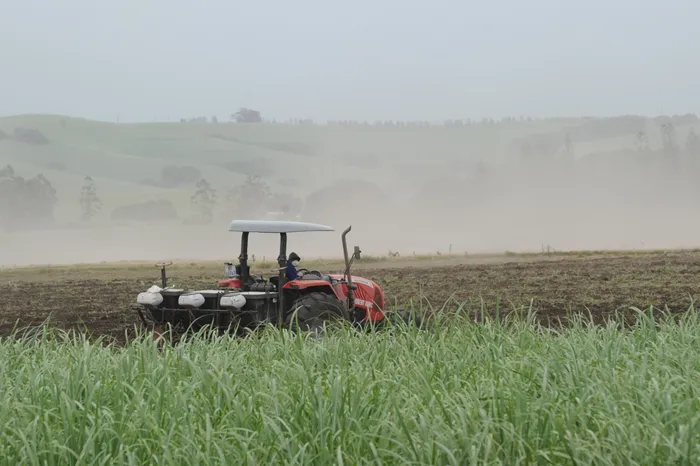Limited progress in South Africa's release of government-owned land: what it means for development

A file picture showing a KwaZulu-Natal North Coast sugarcane farm. Beneficiaries of a settled land claim for prime land in KwaDukuza were yet to benefit from the property due to disputes.
Image: Karen Sandison/ Independent Newspapers
While the release of the government-owned land remains ever more important in South Africa's development, the country has seen very little progress in that regard.
Disappointingly, the Department of Land Reform and Rural Development has made limited progress on this matter despite this being one of the central aspects of the agricultural sector's inclusive growth agenda, says Wandile Sihlobo, the chief economist at the Agricultural Business Chamber of South Africa(Agbiz).
“In essence, while we confront many present-day challenges, these long-term reforms of the AAMP and land release must continue for the sector to achieve its inclusive growth aspirations,” Sihlobo said.
Delivering the Department of Land Reform and Rural Development Budget Vote Speech last week, Minister Mzwanele Nyhontsho said the overall budget of the Department for the 2025 financial year is R9 820 billion.
He said relative to the total allocation, Land and Tenure Reform and Restitution have received the largest share, amounting to R6 168 billion or 63 per cent of the total allocation. “This demonstrates that our budget is grounded on our core mandate.
"The Land Redistribution and Tenure Reform branch has been allocated a total budget of R1 073 billion. Within this budget, a total allocation of R559 million has been set aside to acquire and allocate 44 000 hectares of land,” Nyhontsho said.
He added that the department continues to process applications for awards of land to labour tenants, which were lodged not later than 31 March 2001. He said it should be acknowledged, though, that the area of tenure security for labour tenants, including the continuing spate of illegal evictions, remains an unacceptable situation.
“The Department is implementing a comprehensive plan to address historical inefficiencies relating to the management of state land. This includes calling for accountability from some recalcitrant officials and ensuring consequence management.
"Our Department is also addressing the challenges related to Communal Property Associations (CPAs), particularly their dysfunctionality. To address this challenge, the Department is implementing measures that include the establishment of an independent CPA office, which is currently headed by an Acting Registrar.
"Furthermore, a continuous process of training the executives of these structures on governance, financial management, land management, and related skills and capabilities is currently underway. A series of roadshows that will culminate with a CPA Indaba has also been planned.”
The Minister said the Commission on Restitution of Land Rights has been allocated a budget of R3.7 billion for the current financial year. He said the speed with which the claims are settled is heavily reliant on the allocated budget year on year.
“To address the challenge of expediting the pace of settling of the old order land claims, i.e. those lodged before the original cut-off date of 31 December 1998, the Commission is streamlining processes, underwritten by new policies and standard operating procedures (SOPs), as part of an acceleration strategy.
"That said, however, additional financial and human resources will still be required, and in general terms, we have to focus on enhancing the efficiency of the offices of the Land Claims Commission in the whole country.”
Speaking at the NARYSEC YOUTH pass-out event last month, Stanley Mathabatha, the Deputy Minister in the Department of Land Reform and Rural Development, said they were well aware of the challenges facing rural communities.
He said these challenges include high levels of poverty and unemployment.
“One of the most pressing issues is the legacy of colonial and apartheid uneven development between, on the one hand, developed metropolitan regions and, on the other hand, underdeveloped rural areas.
"The development challenge is evident in the limited access rural communities have to economic infrastructure, economic investment, economic resources and economic opportunities that you find in developed metropolitan regions,” Mathabatha said.
The deputy minister said that as a result, they continue to see growing migration patterns from rural areas to developed metropolitan regions, as people search for economic opportunities and resources.
“Some refer to this process simply as urbanisation. However, we understand that successful rural development, grounded in equitable investment and distribution of resources, and in continuously improved integrated strategic planning, can change this pattern.
"By making rural areas more attractive and economically viable, we can begin to redress the uneven development imbalance and create a more inclusive, balanced national development path.”
The Department of Land Reform and Rural Development said it knew the strength, resilience and untapped potential in the rural space.
“We are investing in skills, from agriculture to engineering, technology and rural industrialisation, from new venture creation to economic and social infrastructure development, to name but a few, so that youth become the drivers of rural transformation.”
Independent Media Property
Related Topics: